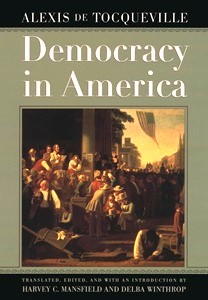
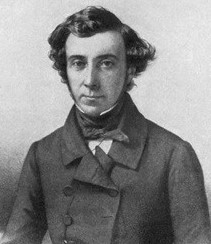 Democracy in America (Jan.-Apr. 1962) aired “The Chief Instrument of Freedom” on March 28, 1962 as the 11th of its 14 episodes.
Democracy in America (Jan.-Apr. 1962) aired “The Chief Instrument of Freedom” on March 28, 1962 as the 11th of its 14 episodes.
Alexis de Tocqueville (1805-1859) was sent to America in 1831 by the French government to study the American prison system. While in America Tocqueville used this official pretext to study American society in its totality. He published the result of his travels and researches in two volumes titled Democracy in America, volume I in 1835 and volume 2 in 1840. It has become a classic of social and political science and a landmark work still taught in colleges and universities for its trenchant insights on important aspects of the unique American experiment with its concept of a democratic republic, including social critiques on its moral, economic, and legal systems, with one of the most important being the role of the government on such matters as freedom of speech and the press.
Democracy in America, the radio program, dramatized Tocqueville’s masterwork in 14 episodes covering various aspects of American social or political life, with titles like “Where Could I Be Better Off,” “Tyranny of Majority,” “Any Woman is a Lady,” and this week’s episode (the 11th of the 14)—the most important to my way of thinking, freedom of speech—which has been given the title of “Chief Instrument of Freedom.” This episode focuses on a brief history of our freedom of the press from its earliest days of the print newspaper (long before radio, television, the telephone, the internet or any other method of getting information into the hands of the public became available outside of travel by horseback; New York at one time enjoyed 55 separate independent newspapers, for instance) and how our views on freedom of speech have evolved (and by present day extension the inherent possibility of its misuse and deliberate misinterpretation with censorship the goal in order to favor a certain viewpoint desired by those of a particular political persuasion), and how it must be protected at all costs. In this day and age when terms such as misinformation and disinformation are tossed about freely, and openly given as valid reasons to censor any speech with which one happens to disagree, even though no acceptable option is put forth as to who decides what exactly is misinformation or disinformation, Tocqueville’s observations and firsthand studies on the subject are more relevant than ever and are clearly and succinctly expressed in this radio dramatization for future generations, reminding us just why our freedom of speech and the press have become our “Chief Instrument of Freedom.” If for any reason you find it impractical or impossible to listen to all 28 minutes and 8 seconds of this episode, I cannot urge you more strongly and without reservation to set aside and listen carefully to the last 10 minutes, beginning with minute 18, for Tocqueville’s words were never more true, nor ever more needed for their paramount importance as they are today.
(The linked book cover above contains both volumes of Democracy in America and is considered by many scholars to be the most definitive translation of the work to date.)
Play Time: 28:08
{Airing on a Wednesday evening at 8:30 in late March of 1962, the neighborhood gang was now old enough to find interest in such a historical non-fiction radio experience as the episodes of Democracy in America provided, as the programs also coincided with what they were learning in their civics class. Nevertheless, they still had passion enough for their favorite science fiction and fantasy magazines, no longer printed on pulp paper as most were in previous decades but all three of their selections below printed as digest publications with higher quality paper. Analog (1930-present) had transitioned from its initial Astounding SF title to its current Analog SF & F title with its October 1960 issue. This March 1962 issue, among others, had stories by Randall Garrett, John Brunner, and Poul Anderson. Analog was a monthly in 1962. Galaxy (1950-80) had solidly inserted itself into the top tier of SF magazines by 1962 and regularly featured top rate fiction from classic talents as well as an eager crop of newer writers enthusiastically exploring new sfnal territory. H. L. Gold was the magazine’s first editor, but when he stepped down the magazine’s editorial chair was officially filled by Frederik Pohl with the December 1961 issue. The issue below was Pohl’s 3rd as editor. Galaxy was a bi-monthly in 1962. The Magazine of Fantasy & Science Fiction (1949-present) had also made itself a familiar presence from its inaugural issue in the Fall of 1949 and was on a definite upward swing in popularity, easily seen by a look at the names listed on the cover of the all star issue below. What a lineup! F&SF was a monthly in 1962.}
[Left: Analog, 3/62 – Center: Galaxy, 4/62 – Right: Fantasy & Science Fiction, 3/62]
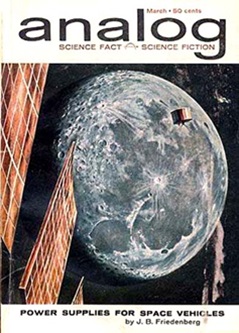
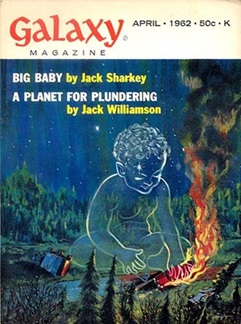
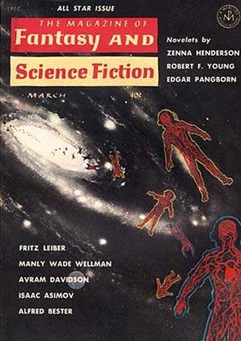
To view the entire list of weekly Old Time Radio episodes at Tangent Online, click here.